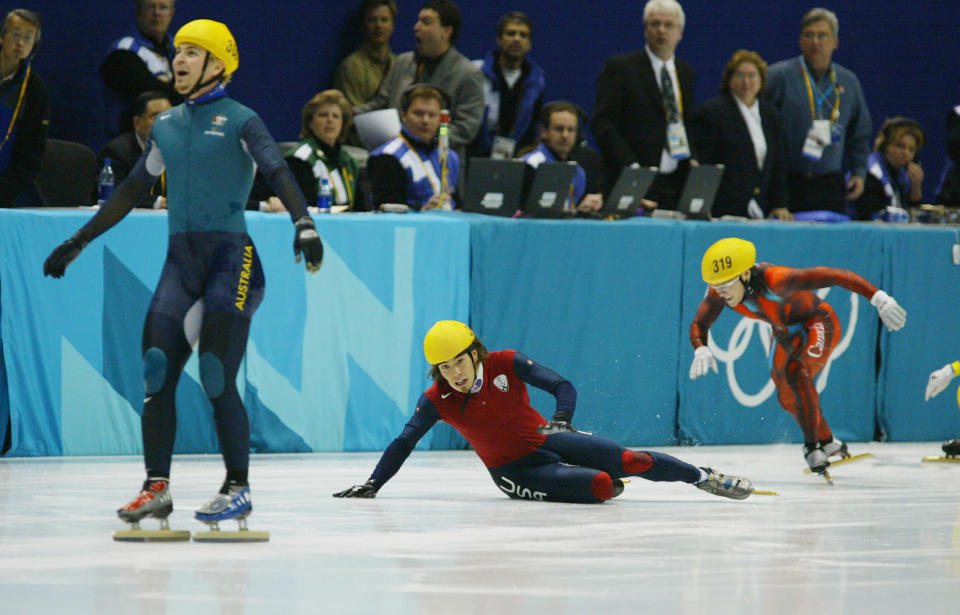The Sochi Olympics event you can't miss

It won't feature much on the endless promos and its champion probably won't get to hang out with David Letterman anytime soon, but there is one Winter Olympic event that should be required viewing.
You shouldn't miss it even if you claim to hate the Olympics or are allergic to television, not even if you believe that watching the Games is giving tacit approval to Russia's spotty record on human rights.
The most must-see Olympic TV is the men's 1,000-meter final in short-track speed skating. Even though it will be over and done with in the space of 90 seconds, the event – out of the 98 that will award medals – might be the one that best sums up what the Games are really about underneath all the corporate nonsense.
That is because victory in the 1,000 at the Iceberg Skating Palace on Feb. 15 will only come if that most terrifying of things for an athlete – uncertainty – is overcome. All those hundreds of hours of training, lifting, striving, eating right and sleeping long can be undone in a split second beyond the control of the would-be winner.
[ Related: US short track skaters see Sochi as a new chance ]
In short track, the ice is so slick and the margins are so tight that a single slip, trip or untimely push from an opponent can bring the whole dream literally crashing down.
Its capacity for calamity is derided by some as unfair – the critics were loud in 2002 when Apolo Anton Ohno and three others stacked it on the final turn and an unknown and unheralded Australian chancer, Steven Bradbury, pulled off an impossible gold.
But such perceived iniquity is not the concern of the armchair fan, whose primary motive is surely to be entertained. In that sense at least, seeing the fastest skaters in the world hurtle around a 365-foot rink at breakneck speed of up to 40 mph while getting so low that they balance with a fingertip is pleasing to the eye.
Then let's be honest: There is that inherent unpredictability. It is not the crashes that make it compelling to watch; it is the constant possibility of them, quite often when you least expect it.
Yet shouldn't that be how an Olympic gold medal is – precious enough that it can never be guaranteed, ready to be snatched away at any time? That the victor has survived it all – the eager opposition, the treacherous track and the evil clutches of Lady Luck?
[ Related: Canada's man of steel Hamelin made for Olympics ]
There is no such thing as a blowout in the 1,000. You won't be switching off midway through like you might for a 5-0 hockey rout, or even a certain football contest last weekend because the Broncos stank the place out and the Red Hot Chili Peppers couldn't save the show.
Admittedly, with the Olympic record standing at 1:23:747 a somewhat shorter attention span is needed.
So, if you're now sold on short track, why the 1,000? If we are following the Summer Games model where brevity equates almost directly to interest and the 100 meters is king, then it should be considered that short track has a shorter discipline, the 500.
But that's over in the blink of an eye and its incredibly short nature means that whoever stakes an early lead regularly wins, with passing opportunities so few. The 1,000 allows for greater tactical nuance, while somehow still being a flat-out sprint.
That is where J.R. Celski, the U.S.' best hope, will try to make his claim. Many think Celski has a better shot in the 1500, where he won bronze in Vancouver, but he has power aplenty and a point to prove.
[ Related: Apolo Ohno the inspiration for J.R. Celski ]
This event was the one that got away for Ohno, now retired and safely wrapped up in the broadcast booth. His best chance was in 2002 only for the ultimate outsider Bradbury to prevail. The Aussie was savvy enough to hang back, predicting that the pressure and desire for glory of Ohno and three others could cause chaos.
"Crazy stuff can happen," said Bradbury.
Away from the short-track arena there are plenty of other highlights. The U.S. vs. Russia men's hockey game in pool play should get the juices flowing nicely and in women's figure skating a trio of ambitious Americans will try to topple reigning queen Kim Yuna. Up in Krasnaya Polyana, a snowboarding showdown looms on the halfpipe between Shaun White and precocious 15-year-old Ayumu Hirano, the sport's past and present colliding with its future in this ludicrously difficult and spectacular discipline.
The Olympics, in either its summer or winter variety, has the habit of reeling in the television viewer, snaring even those professing no interest whatsoever into hours of viewing, cheering and biting of nails.
Perhaps then, you'll be one of those who gets to see almost every event, a reality made possible by the broadcasters' online outlets which pump out constant coverage of pretty much everything.
If not, if you are just too busy with "Family Guy" re-runs or if college basketball is more your thing or if you're one of those people with important stuff to do and one event is going to be your snapshot of Sochi, then try the 1,000 as your poison of choice. It's an event with thrills and spills and a heart as cold as the ice they race on.
More Winter Olympic coverage on Yahoo Sports:

